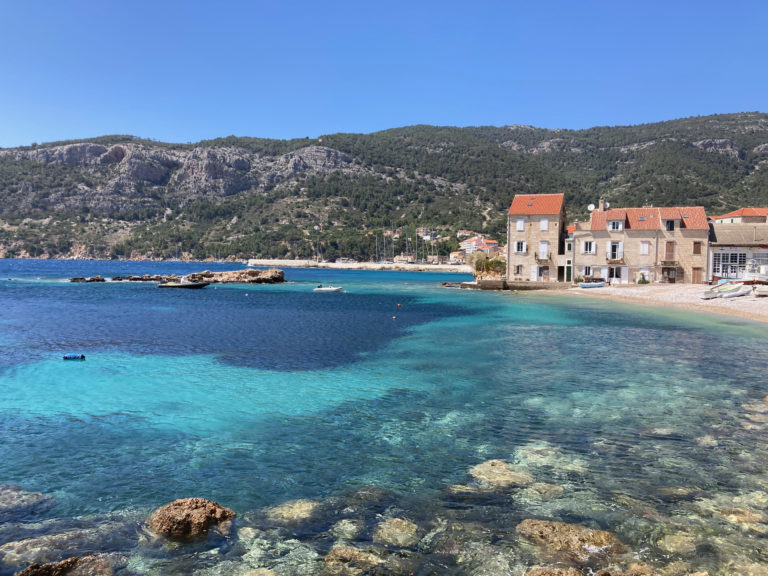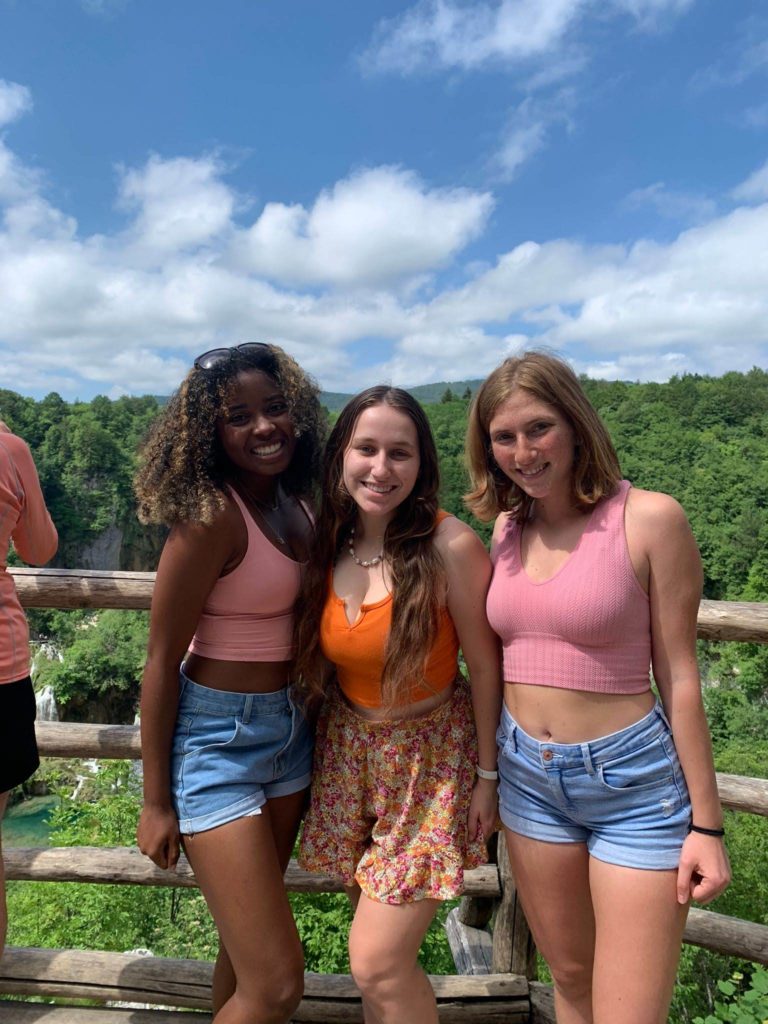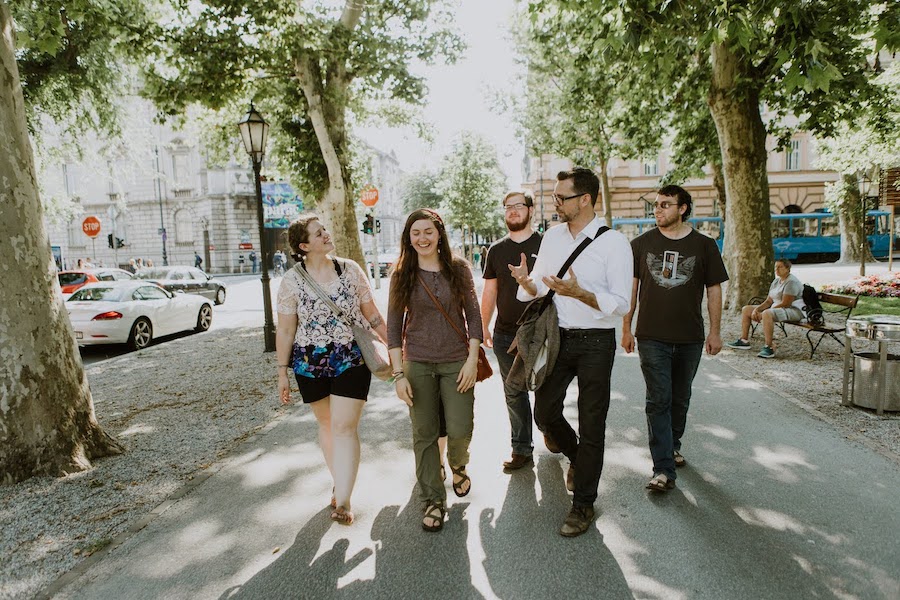
All histories are layered and complex and this is especially true when it comes to understanding the long and complicated history of the Balkans and the breakup of Yugoslavia.
A partnership with the European Center for the Study of War and Peace (ECSWP) provides Loyola Marymount University students with the unique opportunity to study for a summer, or a semester, in this dynamic, post-conflict environment where people are fashioning post-war identities and learning to peacefully co-exist.
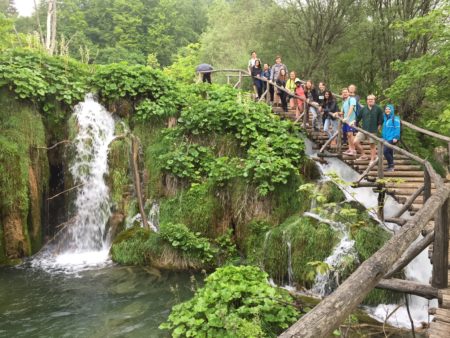
The center was founded by James Taylor and Petra Belkovic Taylor, who are both alums of the LMU Bellarmine College of Liberal Arts and former LMU instructors. At LMU, Petra earned her M.A. in English before going on to earn her Ph.D. in comparative literature from Harvard; while James earned his M.A. in philosophy before completing his Ph.D. in philosophy at Boston College. Petra, a native of Croatia, lived through the wars in the 1990s, partly as a refugee. While she and James were in their respective Ph.D. programs, they decided to run a one-off trip for college students to Croatia.
“The students found the experience incredibly powerful, and Petra and I realized that we could, perhaps, develop something more enduring,” said James. The center now facilitates study-abroad experiences for students from primarily American universities such as LMU, Harvard, and Boston College.
The Socialist Federal Republic of Yugoslavia (1945-1991) emerged after World War II, bringing multiple south Slavic ethnic groups into one state. Under the leadership of communists and Tito, these groups fought together the German and Italian occupiers and various local fascist, Nazi, and nationalistic factions. WWII in the region was consequently also a brutal civil and fratricidal war.
While Tito and the Yugoslav communists turned away from the rigidity of Stalinist communism, they failed to deal with its violent past. On the one hand, Yugoslavia was Europe’s open handed, west-leaning buffer zone during the Cold war era. On the other, it feared and quashed any resurgent nationalist sentiments and made honest dealing with the past impossible.
After Tito died, old wounds and differing points of view violently resurfaced. In the 1990s, the stage was set for extreme nationalisms and a series of bloody conflicts in the area’s most diverse regions (Croatia, Bosnia and Herzegovina and Kosovo). Atrocities were committed, millions were displaced, and an estimated 140,000 people were killed.
This summer, 21 LMU students traveled to Croatia to participate in an intense, five-week experience in which they took two courses focused on conflict and resolution, splitting their time between Zagreb, Sarajevo, and Komiža.
“Being able to see the differences in Zagreb, the coast of Croatia, and Sarajevo was a beautiful way to not only immerse yourself into different cultures within various parts of that region, but also a great way to gain a better understanding of the communities there,” said Julia Lemmon ’23, an international relations major with double minors in urban studies and business administration. “Before participating in the summer 2022 program, I had no knowledge about the Balkans culture or history and I can confidently say that, after being here for almost two months, I have fallen in love with it. In fact, I have already begun making connections and plans to try to move back to Zagreb after I graduate.”
Zagreb is the vibrant capital of Croatia. Sarajevo is the political, financial, social, and cultural center of Bosnia and Herzegovina, as well as one of the focal points of the wars that erupted after the disintegration of Yugoslavia. Komiža is a Croatian fishing village on the island of Vis in the Adriatic Sea. Through coursework and conversations with war survivors, as well as political, religious, and intellectual figures in each of these places, students experienced firsthand the palpable sense of urgency around the critical work of peacemaking and reconciliation.
“We treat Croatia and the surrounding areas as a laboratory,” said James. “Although we learn a lot about the Balkans, intellectually and experientially, we help our students to recognize that navigating conflict well and seeking peace and reconciliation are essential to any well-lived life, wherever it may take place.”
LMU and ECSWP started collaborating in 2017, and in 2018 James and Brian Treanor, Charles S. Casassa Chair and professor of philosophy at LMU, ran the first summer program for LMU students in Croatia. It was wildly successful and many students sought spots in the program the following year. The second summer of the program, in 2019, was led by James, Petra, and Jennifer Ramos, associate professor of international relations at LMU. It too was a hit and led to the development of a semester long program.
Unfortunately, the COVID-19 pandemic disrupted the strong momentum of those first two years and delayed the planned launch of the semester program. However, thanks to strong support from the LMU Study Abroad office, significant student interest, and cross-departmental support from BCLA faculty, the summer program was rebooted this year and the highly anticipated “War, Peace, and Reconciliation” semester program was launched.
In spring 2022, three LMU students participated for the first time in ECSWP’s semester program, studying alongside students from Boston College, Gordon College, Boston University, and Harvard University. The cohort also included students from the University of Zagreb and Vern University in Zagreb.
“The shared experience of personal and academic growth in a place where society is grappling with peace and reconciliation encouraged and taught students how to care for their immediate neighbor, their fellow students,” said James.
After the invasion of Ukraine in February, Alina Zhurekova, a student from Mariupol, joined the program. Alina’s experience brought a very real dimension to what LMU students were studying, and illuminated the importance of how we address instability, conflict, and violence.
Jadan Vines ’23, an international relations and history minor in BCLA, was one of the inaugural participants of the semester long program. She was drawn to it because the war in Yugoslavia officially ended the year she was born and she couldn’t pass up an opportunity to study in one of the most complex and complicated regions in the world.
“This program has greatly enhanced my learning and is the most perfect connection between international relations and history I’ve ever encountered,” said Vines.
Students in the semester program took a course on the history, culture, and politics of the Balkans, as well as courses examining war and peace through the lenses of literature, theology, and philosophy.
“A lot of the reconciliation strategies we learned were introduced in our ‘War and Peace: Philosophical and Theological Perspectives’ course,” said Vines. “The concept of double-vision calls us to step outside our own personal identity into the shoes of the ‘other’ and then use what we learn from their perspective to inform our own. I think this is the best course for reconciliation in the Balkans. If Serbs, Croats, Bosnians and other groups affected by the war are able to see that division suppresses them all, it may be easier to broach the subject of reconciling a group of ethnic relatives that used to live in relative harmony.”
Over the course of the semester, students took a weeklong trip to Serbia, a weeklong trip to Bosnia and Herzegovina, and spent three weeks on the island of Vis. Some of the most poignant moments came on these trips listening to Christians, Muslims, Bosniaks, and Croats from all walks of life speak about local history, politics, human nature, violence, and peace building.
“Amra from Sarajevo lived through the genocide of Bosniaks in Bosnia and Herzegovina during the war and was one of the many interesting people we met,” said Vines. “She taught us how to be resilient in times of conflict. Amra got married during the war, went to concerts, and even went to a conference in Spain. She had to go through the heavily shelled Tunnel of Hope to leave the country, and amazingly, she came back. She came back to death and destruction because that country was her home and she would live, die and suffer with her people.”
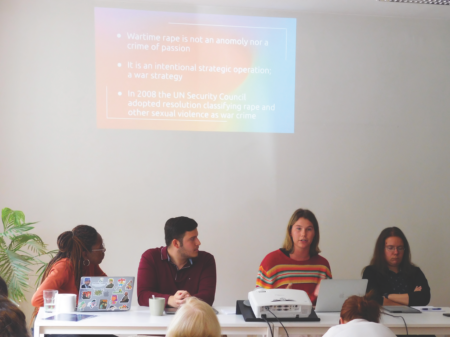
The semester concluded with an academic conference on the theme of “Peace in Crisis.” All the students on the semester-long program, along with a number of visiting professors, presented current work on topics related to peace, war, healing, remembering, and reconciliation.
Treanor presented “Learning Under the Shadow of Death, or Humanities on a Burning Planet,” which reflected on the justification for studying the humanities in the face of concrete, existential threats like war, pandemics, and climate change; and Vines presented “Ethnic Violence through Scapegoating” connecting the example of Muslim Bosniaks during the war and Asian Americans in the U.S. during the COVID-19 pandemic. Additional presentations were made by the other LMU students in the semester program, including: Margaret Prost (“How Aggression Shapes our Morality”), and Anika Hanson (“Rape as a War Tool: How Women Become Scapegoats in War”).
“I used the philosophy and theology of Paul Ricouer and Emmanuel Levinas to propose solutions to the global issue of ethnic scapegoating that leads to violence,” said Vines.
Students can also choose to intern with one of European Center for the Study of War and Peace’s partner organizations. These include government watchdog agencies, gender rights activist organizations, foundations for sustainable development, environmental agencies, publishing and media houses, and others. Notably, students this summer were so engaged with topics and issues covered in the program, that several decided to stay in Croatia beyond the end of the term to pursue summer internship opportunities.
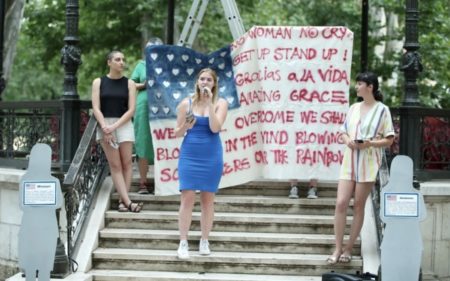
Lemmon actually has two internships: one at the Konrad- Adenauer- Stiftung Foundation’s Office in Zagreb for Croatia and Slovenia and the other at the Solidarna Foundation.
“I think one of the main things the summer program really helped me with, in terms of preparing me for my internships, was understanding how individuals craft their identities based on their past experiences and surroundings, both physical and cultural,” said Lemmon. Developing these global and cultural competencies has helped Lemmon immensely in her communications and research work with both organizations.
“This experience has changed me at a very deep level,” said Vines. “It has shown me the residual destruction of war and forced ethnic and religious division, but is has also given me tremendous hope that no matter how far violence has gone, there is always a way back.”



